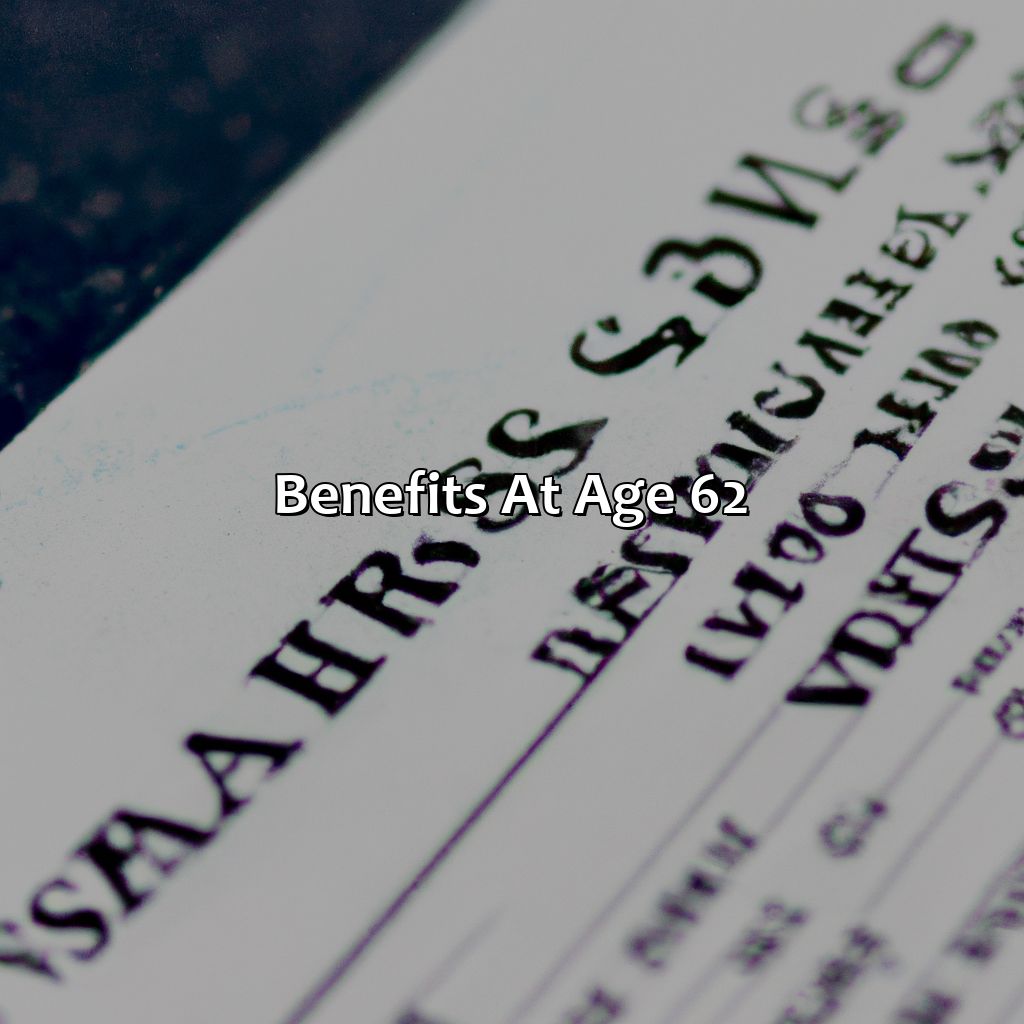How Much Social Security Will I Get At Age 62 Born In 1961?
Key Takeaway:
- Individuals born in 1961 can begin receiving Social Security benefits at age 62, but their benefit amount will be reduced by up to 30%. It’s important to consider other sources of retirement income and expenses when deciding whether to retire early.
- The amount of Social Security benefits received at age 62 is based on an individual’s work history and earnings, with higher lifetime earnings resulting in higher benefits. Other retirement income, such as pensions and retirement accounts, can affect the amount of Social Security benefits received.
- Full retirement age for individuals born in 1961 is 67, and waiting until full retirement age to begin receiving benefits can result in higher monthly benefit payments. Factors such as work history, life expectancy, and financial needs should be considered when deciding when to begin receiving Social Security benefits.
You may be wondering how much social security you’ll receive at age 62, and you’re not alone. This article will help you understand the different benefits you can receive at 62, depending on when you were born in 1961. Get ready to discover the financial security you can gain from social security.
Social Security Benefits
To understand Social Security Benefits and ‘how much social security you may get at age 62, born in 1961?’, examine the Eligibility Requirements and Calculation of Benefits sections.
Check these two parts for essential info to know if you are eligible for retirement benefits and what amount you may receive.

Image credits: retiregenz.com by Yuval Arnold
Eligibility Requirements
To qualify for Social Security benefits, you must have earned enough credits by working and paying into the system. The amount of credits required varies based on your birth year. For those born in 1961 or later, you need 40 credits, which equates to ten years of work. Additionally, you need to have reached age 62 in order to become eligible for retirement benefits.
It’s worth noting that if you choose to start receiving benefits at age 62, your monthly payments will be reduced from what they would be if you waited until full retirement age (which is between 66 and 67 years old). However, if you are considering claiming benefits early due to health concerns or financial necessity, it may still make sense for you to do so.
In order to receive your estimated benefit amount, you can create a “my Social Security” account on the Social Security Administration’s website. This account provides access to personalized estimates of future benefits, as well as other resources related to retirement planning.
It’s important to understand the eligibility requirements and potential benefits of Social Security in order to make informed decisions about your retirement income. With careful planning and consideration of your individual circumstances, you can create a solid foundation for financial security in your later years.
Calculating your benefits is like trying to solve a Rubik’s cube blindfolded, with one hand tied behind your back, and a calculator missing a few buttons.
Calculation of Benefits
When estimating the benefits you’ll receive from Social Security at age 62 (for those born in 1961), it’s important to consider several factors. These can vary based on your earnings history, how long you’ve worked and contributed to Social Security, and other variables.
Here are five key points to keep in mind when calculating your benefits:
- Your monthly benefit amount may be reduced if you begin receiving benefits before full retirement age
- You can earn delayed retirement credits by waiting until after full retirement age to start collecting benefits
- Your specific benefit amount will depend on your earnings record over time
- Early filing for disability benefits carries different rules and calculations
- How other sources of income may affect the total amount you receive
It’s crucial to understand that every individual’s circumstance is unique, and there are many nuances that come into play when determining what you stand to receive from Social Security. Some important considerations include family size, marital status, annual income, and other relevant financial factors.
One potential suggestion is to delay taking benefits until full retirement age or beyond, as this can result in higher monthly payments. Alternatively, consider strategies for maximizing your lifetime benefit over a longer period of time. This might entail planning ahead for various scenarios or working with a financial advisor to explore options that make sense for your personal needs.
Turning 62 may mean you’re eligible for Social Security benefits, but it also means you’re officially a senior citizen. Welcome to the club!
Benefits at Age 62
To grasp the perks of social security at 62, you must learn about early retirement reduction and the full retirement age. These portions will aid you in comprehending the sum you’ll acquire from social security if you select to retire early. If you wait until your full retirement age, you’ll get an enhanced amount.

Image credits: retiregenz.com by Harry Jones
Early Retirement Reduction
Retirement Benefit Decrease due to Early Filing
If you opt to retire before full retirement age, your benefits will be permanently reduced by a certain percentage for each month of early filing. The percentage decreases will depend on your birth year. If you were born in 1961 and file for retirement benefits at the minimum age of 62, your benefit reduction will be roughly 28%.
Filing for Early Retirement Can Have Long-Term Consequences
It is essential to consider how filing for Social Security early can affect your financial stability in the long run. Reduced benefits lead to lower monthly payments throughout the entirety of your retirement years. By considering other methods of income generation or postponing retirement, people could have higher Social Security payments and greater financial peace of mind.
Delaying Beyond Full Retirement Age Provides Credit Increases
For individuals who defer taking the Social Security benefits until after full retirement age, there are credit increases available up until the age of 70. With each year after full retirement age that individuals delay taking their benefits, their payment credit increases by approximately 8%. With this knowledge and consideration of different scenarios, people can maximize their benefit amount.
Case Study
One case study revealed a woman took her Social Security benefit at about $800 per month when she was about 62. However, if she delayed her benefit until 66 (full retirement), her monthly payment would have risen to over $1,100 instead. People should carefully weigh their decision regarding whether or not filing early is worth it in the long run based on an individual basis.
At full retirement age, you can finally retire from using online retirement calculators.
Full Retirement Age
The retirement age when Social Security benefits can be collected at full amount depends on an individual’s birth year. For those born between 1943 and 1954, the full retirement age is 66. This gradually increases to 67 for those born in 1960 or later.
Once an individual reaches full retirement age, they can receive their entire Social Security benefit without any reduction due to work income. However, if someone decides to start collecting benefits earlier, the monthly amount will be reduced based on how early the collection starts.
It’s important to note that collecting benefits before full retirement age may not always be the best financial decision for everyone. Those who continue working while receiving early benefits may face a reduction in income due to the reduction of monthly benefit payments. Moreover, starting early means receiving a lower monthly payment throughout one’s lifetime.
Therefore, it’s recommended that individuals weigh their options carefully and consider factors such as their current financial situation and future needs before deciding when to begin receiving Social Security benefits. Consulting with a financial planner or advisor can also help make informed decisions about retirement planning.
At least some things don’t get worse with age – like the size of your Social Security benefits (if you play your cards right).
Factors Affecting Benefit Amount
To know how much Social Security you’ll get at 62 (born in 1961), you need to understand the factors that influence the benefit amount. Your work history, earnings, plus other retirement income, can all affect the Social Security you’ll be getting. Let’s have a closer look at these subsections.

Image credits: retiregenz.com by James Woodhock
Work History and Earnings
For the calculation of social security benefits, work history and earnings play a vital role. The Social Security Administration (SSA) considers the amount of money earned by an individual over their lifetime to determine their monthly benefit amount.
Here is a table showcasing how work history and earnings affect social security benefits for individuals born in 1961 who retire at age 62:
| Average Monthly Earnings | Estimated Monthly Benefit | |
|---|---|---|
| Scenario 1 | $2,000 | $924 |
| Scenario 2 | $3,000 | $1,177 |
| Scenario 3 | $4,000 | $1,430 |
The average monthly earning column shows how much an individual earned per month on average throughout their career. Based on this average monthly earning, the estimated monthly benefit column displays the approximate amount that a person will receive once they turn 62.
Work history and earnings also have specific rules that affect social security payments. For example, the SSA uses Indexed Earnings to adjust actual earning amounts due to inflation and better reflect current wage rates when calculating benefits. Additionally, for those receiving Social Security Disability Insurance (SSDI), there is no limit on the amount of wages or self-employment income they can earn while receiving benefits.
Understanding how work history and earnings impact social security benefits can help individuals plan for retirement accordingly. By having a clear understanding of these factors and working towards maximizing their income over time, retirees can ensure a more stable financial future.
It is essential to note that work history and earnings are just some of the many factors affecting social security benefit amounts. Other factors like taxes paid throughout an individual’s working lifespan and claiming age also play critical roles in determining benefits.
I’m not saying you should rob a bank in your retirement, but it might be worth looking into other sources of income besides social security.
Other Retirement Income
Retirement income, aside from social security benefits, affects the amount you receive at age 62. Examples include pensions, annuities, or part-time employment earnings. These sources of income may reduce the monthly benefit amount given by Social Security.
It is important to note that only earned income counts towards these reductions. Unearned sources do not affect benefits. The reduction rate varies based on income and filing status. SSA offers detailed online gross earnings limits charts for various situations to anticipate potential reduction in retirement benefits.
Pro Tip: Maximizing retirement savings, such as managing investment accounts or reducing debts, can help guarantee a financially stable post-retirement period with fewer budgetary restrictions.
Five Facts About How Much Social Security Will I Get at Age 62 Born in 1961:
- ✅ For those born in 1961, the earliest age to start receiving Social Security benefits is 62. (Source: SSA)
- ✅ The full retirement age for those born in 1961 is 67, meaning benefits will be reduced if claimed at age 62. (Source: SSA)
- ✅ The maximum monthly benefit for someone turning 62 in 2023 (born in 1961) is $3,269. (Source: SSA)
- ✅ If a person earns more than a certain amount ($18,960 in 2021), their Social Security benefits may be reduced before full retirement age. (Source: SSA)
- ✅ Social Security benefits are adjusted for inflation each year, so the amount received will likely increase over time. (Source: SSA)
FAQs about How Much Social Security Will I Get At Age 62 Born In 1961?
How much social security will I get at age 62 born in 1961?
As a person born in 1961, you can start receiving Social Security benefits at age 62. The amount of your benefit will depend on several factors, including your earnings history and whether you continue working while receiving benefits.
Can I get an estimate of my Social Security benefits?
Yes, you can use the Social Security Administration’s online calculator to receive an estimate of your benefits. The calculator uses your earnings history to estimate your benefit amount at different ages.
Can I work and still receive Social Security benefits at age 62?
Yes, you can work and still receive Social Security benefits at age 62. However, if you earn more than a certain amount, your benefits may be reduced. In 2021, the earnings limit is $18,960 per year.
Is there a penalty for taking Social Security benefits at age 62?
Yes, there is a penalty for taking Social Security benefits at age 62. If you start receiving benefits before your full retirement age, your benefit amount will be permanently reduced.
What is my full retirement age?
Your full retirement age is based on your birth year. For those born in 1961, your full retirement age is 67. If you start receiving benefits before your full retirement age, your benefit amount will be permanently reduced.
Can I delay my Social Security benefits to receive a higher amount?
Yes, you can delay your Social Security benefits to receive a higher amount. If you delay receiving benefits until after your full retirement age, your benefit amount will increase by 8% per year until age 70.
